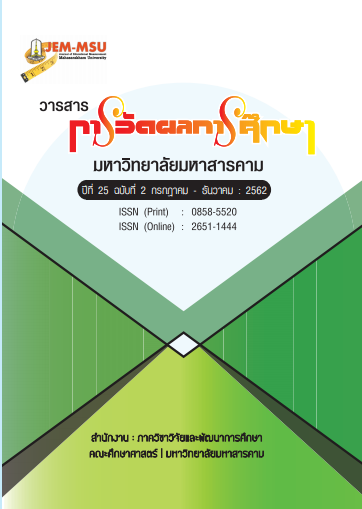Development of Science Learning Activity Packages on Brain-Based Learning for Grade 7 Students
Main Article Content
Abstract
The purposes of this research were: 1) to find the effectiveness index of the science learning activity packages on brain-based learning on the topic of Life Processes of Plants for grade 7 students, 2) to develop the analytical thinking skill of grade 7 students who studied by using the science learning activity packages on brain-based learning on the topic of Life Processes of Plants to meet the criterion of 80 percent, 3) to study the satisfaction of grade 7 students with the science learning activity packages on brain-based learning on the topic of Life Processes of Plants for grade 7 students. This study employed experimental research methodology. The sample consisted of 32 grade 7 students from Group 2 who studied in the first semester of the academic year 2016, obtained through cluster random sampling. The research tools were: 1) the science learning activity packages on brain-based learning on the topic of Life Processes of Plants, 2) plans for organizing for learning incorporating the learning activity packages, 3) a learning achievement test 4) an analytical thinking test, and 5) a questionnaire inquiring the students’ satisfaction with the science learning activity packages on brain-based learning. The statistics used in the study were percentage, the mean, and standard deviation. One sample t-test was used in hypothesis testing.
The results were as follows:
1. The effectiveness index of the science learning activity packages on brain-based learning on the topic of Life Processes of Plants for grade 7 students was 0.6510.
2. The analytical thinking skill of grade 7 students who studied with the science learning activity packages on brain-based learning on the topic of Life Processes of Plants was higher than the 80 percent criterion, with statistical significance at the .05 level.
3. The grade 7 students’ satisfaction with the science learning activity packages on brain-based learning on the topic of Life Processes of Plants, on the whole, was at the highest level.
Article Details
The content and information contained in the published article in the Journal of Educational Measurement Mahasarakham University represent the opinions and responsibilities of the authors directly. The editorial board of the journal is not necessarily in agreement with or responsible for any of the content.
The articles, data, content, images, etc. that have been published in the Journal of Educational Measurement Mahasarakham University are copyrighted by the journal. If any individual or organization wishes to reproduce or perform any actions involving the entirety or any part of the content, they must obtain written permission from the Journal of Educational Measurement Mahasarakham University.
References
ทิศนา แขมมณี และ คณะ. (2544). วิทยาการด้านการคิด. กรุงเทพฯ : สถาบันพัฒนาคุณภาพวิชาการ.
ประพันธ์ศิริ สุเสารัจ. (2556). การพัฒนาการคิด. กรุงเทพฯ : 9119 เทคนิคพริ้นติ้ง.
ปวีณา หาดทวายกาญจน์. (2555). ผลการใช้ชุดกิจกรรมวิทยาศาสตร์ของนักศึกษาระดับมัธยมศึกษาตอนต้น. การศึกษาค้นคว้าอิสระ กศ.ม. มหาวิทยาลัยมหาสารคาม : มหาสารคาม.
รัตนา ชุปวา. (2553). การพัฒนาชุดกิจกรรมวิทยาศาสตร์ สาระที่ 1 สิ่งมีชีวิตกับกระบวนการดำรงชีวิต สำหรับ นักเรียนระดับชั้นมัธยมศึกษาปีที่ 1 โรงเรียนกันทรารมณ์ อำเภอกันทรารมณ์ จังหวัดศรีสะเกษ, วารสารวิชาการมหาวิทยาลัยราชภัฏศรีสะเกษ. 4: 33-48
ลักขณา สริวัฒน์. (2549). การคิด. กรุงเทพฯ : โอเดียนสโตร์.
วิมลรัตน์ สุนทรโรจน์. (2554). นวัตกรรมตามแนวคิดแบบ Backward Design. พิมพ์ครั้งที่ 3. กาฬสินธุ์: ประสานการพิมพ์.
วิโรจน์ ลักขณาอดิศร. (2550). การเรียนรู้โดยใช้สมองเป็นฐานกับการสร้างเด็กเก่ง. กรุงเทพฯ: ซีเอ็ด ยูเคชั่น.
ศรีกัญภัสสร์ รังสีบวรกุล. (2554). ธรรมชาติการเรียนรู้ BBL IQ EQ MI. มหาสารคาม : มหาวิทยาลัย มหาสารคาม.
สำนักวิชาการและมาตรฐานการศึกษา. (2553). แนวทางการจัดการเรียนรู้ ตามหลักสูตรแกนกลางการศึกษา ขั้นพื้นฐาน พุทธศักราช 2551. กรุงเทพฯ : พิมพ์ครั้งที่ 2, โรงพิมพ์ชุมนุมสหกรณ์การเกษตรแห่ง ประเทศไทย จำกัด.
สุปาณี วังกานนท์. (2558). การพัฒนาชุดกิจกรรมการเรียนรู้วิทยาศาสตร์เพื่อแก้ปัญหาการคิดวิเคราะห์ตาม หลักการของ Marzano สำหรับนักเรียนชั้นมัธยมศึกษาปีที่ 2. วิทยานิพนธ์ กศ.ม. มหาสารคาม : มหาวิทยาลัยมหาสารคาม.
สุมน อมรวิวัฒน์. (2543). ปฏิรูปการเรียนรู้ ผู้เรียนสำคัญที่สุด. พิมพ์ครั้งที่ 3.กรุงเทพฯ : สำนักงาน คณะกรรมการการศึกษาแห่งชาติ.
อรัญญา โสมนัส. (2552). ปัจจัยที่ส่งผลต่อคุณภาพมาตรฐานด้านผู้เรียน การคิดวิเคราะห์และ วิจารณญาณ ของสถานศึกษาที่ได้รับการประเมินภายนอกรอบที่ 2 สังกัดสำนักงานเขตพื้นที่การศึกษา ขอนแก่น เขต 5. ปริญญานิพนธ์ ศศ.ม. ขอนแก่น : มหาวิทยาลัยขอนแก่น.
พรพิไล เลิศวิชา และอัครภูมิ จารุภากร. (2550). สมองเรียนรู้. กรุงเทพฯ. สถาบันวิทยาการเรียนรู้. บริษัทศิริ วัฒนาอินเตอร์พริ้นท์ จำกัด (มหาชน)
Caine, R.N. & Caine, G. (1989). 12 Principles for Brain - Based Learning. [Online]. Available : https://www.nea.org/teachexperience/braik030925.html.
Jensen. (2000). Brain - based learning. San Diego, CA : The Brain Store Publishing.


